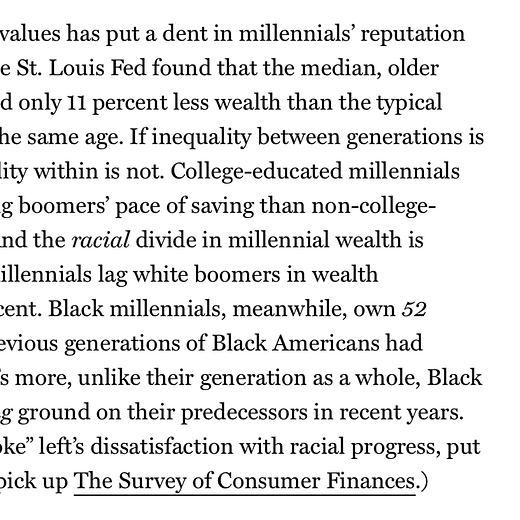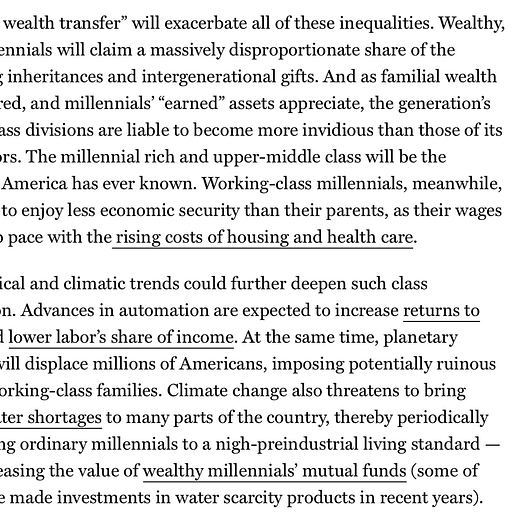There might be too much advertising, but not for the reasons you think
exformation #7 | An infrastructure deal is struck, President Biden pulls back comments that social media sites are killing people, Sen Klobuchar files a new Sec 230 bill + much more...
A tech policy newsletter from an outsider.
Free at the point of consumption.
Delivered every Monday (+/- a couple hours or days).
News, notes & quotes
Sorry friends. I’m really late on this newsletter. On the plus side, I’m now an uncle.
On the podcast this week, I talk with Caden about what I’d do with $100 billion dollars. I’d fund projects in de-extinction and ecological diversity, cross-species communication, and mosquito-transmitted disease eradication.
It’s been a bumpy ride on infrastructure. Read this story, or rather, read into it:
Congressional negotiators and the Biden administration tried on Monday to salvage a nearly $600 billion bipartisan agreement to invest in roads, water pipes and other physical infrastructure, after Republicans rejected a key component to pay for the plan and resisted Democratic plans for an initial procedural vote on Wednesday.
Senators and administration officials are still working to hammer out the details of the deal, including how to ensure that a plan to finance it will secure 60 votes for Senate passage. White House officials expressed confidence on Monday that the agreement could be finalized. But its fate was uncertain.
And last week,
A perfect phrasing: They’re all defending their pet rocks.
Welp. It seems everyone got what they wanted because a deal has been struck. Vox has the story.
Sen Wicker, Sen Capito, and Sen Young just introduced the Funding Affordable Internet with Reliable (FAIR) Contributions Act. The bill text is here. The legislation would direct the Federal Communications Commission (FCC) to conduct a study into the feasibility of collecting Universal Service Fund (USF) contributions from internet edge providers such as YouTube, Netflix, and Google.
Some problems I see:
The point of fees is to support the deployment of that service. Think of tolls, they support the maintenance of those roads. Similarly, USF is concerned with access to communication technologies like broadband. Arguably then, USF should be extended out to broadband, not big tech.
Still, the idea of a toll doesn’t cleanly apply either. Tolls are levied on road users because they use roads. The same isn’t true of communication technologies. The purpose of the Universal Service Fund is to build out service to areas and people without access. As a general principle, it is unclear if users should have to pay a fee to expand access. It’s probably a better idea to fund this through the general fund.
Legislation might create a conflict with PITFA, but don’t quote me on this.
The law will probably have issues in defining “big tech” separate from other software and platform services.
President Joe Biden toned down remarks he made that social media platforms are "killing people." Instead, he cited a Center for Countering Digital Hate study, which identified 12 people responsible for the bulk of vaccine disinformation on Facebook. He implored the companies to "do something about the misinformation" and not take his comments "personally."
Only 12 people are needed to spoil the well. In other contexts, I have called this the myth of the flat network.
A while back I wrote about platform legibility, and its antithesis, illegibility. Legibility comes from philosopher James Scott and is used to describe “a state's attempt to make society legible, to arrange the population in ways that simplified the classic state functions of taxation, conscription, and prevention of rebellion.” Similarly, platforms like Google and Twitter impose legibility upon their users to serve them content and ads.
But there is illegibility as well. Here is an example from the NYT:
At the start of the pandemic, a group of data scientists at Facebook held a meeting with executives to ask for resources to help measure the prevalence of misinformation about Covid-19 on the social network.
The data scientists said figuring out how many Facebook users saw false or misleading information would be complex, perhaps taking a year a more, according to two people who participated in the meeting. But they added that by putting some new hires on the project and reassigning some existing employees to it, the company could better understand how incorrect facts about the virus spread on the platform.
The executives never approved the resources, and the team was never told why, according to the people, who requested anonymity because they were not authorized to speak to reporters…
It doesn’t actually know many specifics about how misinformation about the coronavirus and the vaccines to combat it have spread. That blind spot has reinforced concerns among misinformation researchers over Facebook’s selective release of data, and how aggressively — or not — the company has studied misinformation on its platform.
Truth on the Market just closed out a symposium on Nicolas Petit’s book. His final post has some good nuggets: “Proponents of legislative reform on both sides of the Atlantic appear to share the common view that ongoing antitrust adjudication efforts are both instrumental and irrelevant. They are instrumental because government (or plaintiff) losses build the evidence needed to support the view that antitrust doctrine is exceedingly conservative, and that legal reform is needed…They are instrumental because, again, government (or plaintiffs) wins will support scaling antitrust enforcement in the marginal case by adoption of governmental regulation…But both instrumentalities are, at the end of the line, irrelevant, because they lead to the same conclusion: legislative reform is long overdue. With this in mind, the logic of lawmakers is that they need not await the courts, and they can advance with haste and confidence toward the promulgation of new antitrust statutes.” All of the posts from TOTM symposium can be found here.
Extra: IAPP has a nice review of state privacy legislation.
Senator Klobuchar unveiled a new legislative proposal targeting big tech companies who spread vaccine misinformation. Here is the text. The bill would add a carveout to Section 230, a law already on the books, that grants broad immunity to platforms for speech that users disseminate over their network. Both Republicans and Democrats have taken aim at Section 230 and like so many other bills of this nature, Klobuchar’s bill is unworkable.
Not only is there no standard for vaccine misinformation, public health crises are swift moving. Would, for example, the recent statements by President Biden over Facebook killing people constitute misinformation? Moreover, as CGO research shows, platforms have a strong incentive to purge misinformation because it undermines user engagement.
President Biden has picked Jonathan Kanter to serve as the Justice Department’s assistant attorney general for antitrust. Relatedly, in the WSJ: “The antitrust partnership of Ken Paxton, the Republican attorney general of Texas, and Dina Srinivasan, a left-leaning independent scholar, in a lawsuit against Google is part of a wave of bipartisan scrutiny of technology giants.”
The EU as foil: “The European Parliament has approved emergency measures allowing internet companies to scan users' private messages for material containing child sex abuse. The controversial decision is an interim solution designed to fix problems with the European Electronics Communications Code, which came into force last December.”
Also on the EU front:
Space policy remains underrated and not well understood. Rep. Blumenauer, a senior member of the tax-writing House Ways and Means Committee, proposed a new tax on commercial space flights. FWIW, I really liked this treatment from Noah Rothman of Robert Zubrin’s The Case for Space: “Zubrin is rightly disdainful of the phobias that have kept men earthbound for so long. He convincingly dismantles the notions that cosmic rays, human isolation, prolonged exposure to low gravity, and alien microbes are terrifying barriers to exploring the solar system. He is, however, equally disdainful of NASA’s hidebound commitment to constituency maintenance. He argues that the space agency has subordinated the mission-driven objective of space exploration to the needs of its vendors. That’s doubtlessly true, but NASA remains a critical vehicle for the exploration of space, in part, because pivotal places like Mars have such limited near-term commercial value.”
Writing for The Breakthrough Institute, Emma Kovak makes a strong case that “Genetically engineered crops are key to lower-carbon agriculture.” For me, this was the key graf: “Crop yield increases have historically played a crucial role in limiting land conversion and associated emissions — without them, land use for cereal production would have expanded over 6 times more than it did. Improvements in crop genetics have contributed roughly half of historical yield gains, making yield growth a powerful way to reduce emissions.”
In Wired: No, Facebook and Google Are Not Public Utilities. That should have been evident from the get-go.
A recent Freddie deBoer piece repeated a phrase from the old days, “There is no such thing as independent media; there’s just different kinds of dependence.” It reminded me of something Andrew Potter wrote a couple of years back, suggesting that the paid subscription model isn’t all that it is cracked up to be.
When Potter was the editor of a newspaper, he learned that “advertisers didn’t spend a lot of time trying to dictate what went into the news pages, presumably because they didn’t really care.” But, subscribers complained endlessly. “I lost count of the number of times I took calls from readers calling to complain about something they had read in The Globe and Mail or the Toronto Star or had heard on the CBC, but who swore it was in our pages.” He makes a convincing argument. Since the consumer is always right, inevitably they will begin to “make demands on the editors to shape the coverage in certain ways, which will tend to gradually shift that centre of gravity away from the middle, and towards the political extremes.”
With Cuba in the news, a 2012 survey of economists resurfaced online, which asked if “Cuba’s low per-capita income growth — 1.2 percent per year since 1960 —has more to do with Cuba’s own economic policies than with the U.S. embargo on trade and tourism.” Here is the result:
The big picture is likely right, but the specifics are probably wrong:
Papers and research
MeFi posted this research about choice blindness: “In a 2005 experiment, psychologist Petter Johansson and his colleagues presented each subject with two photographs of women’s faces and asked which they found more attractive. In each case the experimenter then presented the “chosen” photograph and asked the subject to explain their choice. But in fact, using sleight of hand, the experimenter had exchanged the photos and was presenting the one that the subject hadn’t picked.” The original post came from Futility Closet.
HT Zach Graves: “In this paper, we chronicle key U.S. legislative initiatives during the post-World War II history of public policy related to the ownership of publicly funded research-based knowledge. Our motivation for recording this history is the observation that many scholars, who are appropriately concerned about taxpayer rights, have argued for the need for public policy to clarify ownership of the publicness or openness of publicly funded research results when in fact such public policies have long been in place. We conclude this historical trace with the proposition that if the past is prologue to the future, one might expect future administrations to continue to acknowledge the importance of public access to findings from publicly funded research, be that research having occurred in federal laboratories, universities, or private-sector organizations. [SSRN]
“A large literature characterizes urbanisation as resulting from productivity growth attracting rural workers to cities. Incorporating economic geography elements into a growth model, we suggest that causation runs the other way: when rural workers move to cities, the resulting urbanisation produces technological change and productivity growth. Urban density leads to knowledge exchange and innovation, thus creating a positive feedback loop between city size and productivity that initiates sustained economic growth. This model is consistent with the fact that urbanisation rates in Western Europe, most notably England, reached unprecedented levels by the mid-18th century, the eve of the Industrial Revolution.” [The Economic Journal]
There might be too much advertising, but not for the reasons you think
Ads power the Internet ecosystem. They are the sweet juice of the digital world. And, it just so happens that everyone really hates them.
Not long ago, Ethan Zuckerman writing in The Atlantic called advertising the original sin of the web, saying, “The fallen state of our Internet is a direct, if unintentional, consequence of choosing advertising as the default model to support online content and services.” Zeynep Tufekci observed in the New York Times that “ad-based businesses distort our online interactions” since “the companies have an interest in manipulating our attention on behalf of advertisers, instead of letting us connect as we wish.”
Of course, pay no mind to the ads running right alongside all of these articles on The Atlantic and the NYT.
Most of those who take a strong stance against ads condemn the entire enterprise. All ads are bad, they say. But there is a far more subtle critique to levy that is supported by the evidence: The next ad you buy is likely to be poorly spent.
While it is just limited to just TV advertising, a new paper from Brad Shapiro, Gunter Hitsch, and Anna Tuchman spotlights the uncertainty embedded throughout the industry. Here is the big takeaway: “New estimates of TV advertising effectiveness across 288 CPG brands show that advertising generally has little effect on sales and most brands earn a negative ROI. The results cast doubt on the sustainability of financing TV content markets with ad revenue.”
A tweet thread from Shapiro helps to round out the context,
[The] paper doesn't say advertising can never be profitable. For most brands, there is a place on our estimated ad response curve that would be positive total ROI. It's just that most brands in our sample advertise far beyond that point.
The paper doesn't say that advertising has precisely 0 effect on every individual who watches an ad. It says that the aggregate effect is typically sufficiently small that it is (statistically) clear that most firms are advertising too much given cost.
The paper also doesn't say that advertising can't be improved with better ad copy, better scheduling or better measurement practices. We don't evaluate advertising strategies that are far outside the support of the data.
Finally, if your brand advertises for reasons other than creating product sales (e.g., recruiting talented labor, signaling solvency to investors, etc), our estimates can't really help you evaluate the returns on those margins.
Advertising effectiveness (adfx) studies exist in a narrow niche of academia, to be sure, but I’m still struck by how rarely they are mentioned. (FWIW, I reviewed some of the literature here.) In tech policy, my goodness, adfx studies are almost never acknowledged.
For the uninitiated, the best place to start is Lewis and Rao’s aptly titled paper, “The Unfavorable Economics of Measuring the Returns to Advertising.” As the authors hammer home, uncertainty is embedded throughout the industry, and so “most advertisers do not, and indeed some cannot, know the effectiveness of their advertising spend.” Sales are highly variable and it’s difficult to connect a specific ad with a specific conversation.
Even more fundamentally, responsive groups exhibit a bias. Let’s say that a group of people were searching for flights and then got served Orbitz ads. This exposure would happen to a group that already had a much higher proclivity to buy a plane ticket, regardless of the ad. They were searching for flights, after all. Nevertheless, they would be counted as a win if they converted to a sale. Astute advertisers understand these problems and have developed methods and tools to ameliorate them, but the deep uncertainty still remains.
To me, the best evidence of these deep knowledge problems can be seen in the wide variability of ad spending. Companies of similar sizes, margins, and products operating in the same market often differ in their expenditure rates by orders of magnitude. It makes little sense why Etrade spent 12.6 percent of its revenue on advertising while its competitor TD Ameritrade spent only 1.8 percent. Why is Fiat-Chrysler putting 1.6 percent of its revenue to ads while Toyota spends just a third of a percent? None of this should happen unless there is deep uncertainty about adfx.
Of course, some companies are very good at the business, but the totality of research underscores a more subtle undercurrent. There might be too much advertising but not because all advertising is bad. Rather there might be too much advertising because marketers are buying too much of it.








